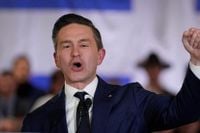As Canada gears up for a snap federal election, recent polling data reveals significant shifts in voter sentiment, particularly in the wake of U.S. President Donald Trump's economic policies. Polls conducted by Oakville News indicate changing preferences for federal parties and growing concerns about leadership effectiveness.
A poll conducted on March 24, 2025, shows that 31.15 percent of voters believe the upcoming election will result in a Liberal majority, while 26.23 percent predict a Conservative majority. Additionally, 24.59 percent expect a Liberal minority and 16.39 percent anticipate a Conservative minority. This marks a notable change from previous sentiments, as a poll from August 2024 indicated that 53.78 percent favored the Conservatives compared to only 32.03 percent for the Liberals.
In the same March 24 poll, half of the voters indicated they would support the Liberal Party of Canada if elections were held immediately, with 40 percent backing the Conservative Party. The New Democratic Party received 6.67 percent of the vote, while the People's Party of Canada garnered 2.2 percent. This aligns with broader national trends showing 40 percent support for the Liberals and 37.3 percent for the Conservatives.
These shifting dynamics are further highlighted by the comments of Kory Teneycke, campaign manager for Ontario Premier Doug Ford. During a discussion at the Empire Club of Canada on March 26, Teneycke warned that Conservative Leader Pierre Poilievre must pivot quickly to address Canadians' fears and anxieties regarding Trump's economic war against Canada. He noted that three recent polls show the Liberals, led by Mark Carney, have overtaken the Conservatives in voter preference.
"You got to get on that issue," Teneycke emphasized, referring to the economic implications of Trump's tariffs on Canada. He pointed out that the federal Liberals hold a significant lead in Ontario, with 48 percent support compared to 33 percent for the Conservatives and 11 percent for the New Democrats.
Trump's impending 25 percent tariffs on the global auto industry, set to take effect on April 2, 2025, are expected to hit Ontario particularly hard, and Teneycke urged that tariffs must become a key issue for Poilievre's campaign. He described the situation as "tsunami waves that are crashing down trees and buildings and everything in their path right now."
Despite these challenges, Poilievre remains focused on his campaign message. When asked about Teneycke's comments linking him to Trump, Poilievre asserted, "I’m the only one who will stand up to the U.S. President," arguing that a Conservative government would take a strong stance against any economic exploitation by the U.S.
In terms of leadership evaluation, a February 19, 2025 poll indicated that 52.60 percent of participants found Poilievre "very unfavourable," while only 28.03 percent rated him "very favourable." This trend reflects a slight increase in negative sentiment toward him compared to previous polls. For example, a December 30, 2024 poll showed that 46.81 percent found him "very unfavourable."
On the other hand, sentiments toward former Prime Minister Justin Trudeau, who has stepped down as leader of the Liberal Party, remain quite negative, with 58.99 percent of respondents rating him "very unfavourable" in an August 6, 2024 poll. This backdrop of leadership dissatisfaction has created an opening for Carney.
Mark Carney, who has taken the helm of the Liberal Party, has been vocal about the need for a strong mandate to negotiate effectively with the U.S. In a campaign rally in Kitchener, Ontario, on March 26, Carney stated, "We need a majority because we need big changes." He emphasized that the upcoming election is "consequential" and that a strong mandate would enhance the government's ability to secure favorable terms in negotiations with the U.S.
Carney's campaign has gained traction, particularly in light of Trump's recent tariff announcements, which have become pivotal issues in the election. A recent Angus Reid poll suggests that the Liberals have opened up an eight-point lead over the Conservatives after trailing by nearly 30 points at the end of December. More than half of those who switched their votes to the Liberals since the start of the year cited Carney's leadership as a key factor.
Mona Fortier, a former cabinet minister and incumbent Liberal candidate, noted that constituents she has met while campaigning express a strong sense of national unity in the face of Trump's threats. "We need to stand up for Canada," Fortier remarked, highlighting the urgency of the election in reinforcing Canada's position against U.S. pressures.
As the election date approaches, Oakville News continues to track voter sentiment and the evolving dynamics between the parties. The latest data reflects a growing concern over leadership and the impact of international relations on domestic policies.
With the potential for significant shifts in voter preferences and the looming threat of economic repercussions from the U.S., all eyes will be on how the candidates respond to these challenges in the weeks leading up to the election.
In conclusion, the upcoming federal election is shaping up to be a critical moment for Canada as parties vie for voter support amid economic uncertainties. The interplay between domestic leadership and international pressures will undoubtedly play a crucial role in determining the outcome.



